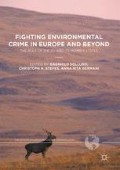Abstract
Despite EFFACE being focused principally on environmental crime in the EU, in the book we look at non-EU states because they have extensive political, social, and/or economic ties with the EU and, therefore, environmental crime in these countries directly and indirectly affects the EU. This chapter introduces the topic of environmental crime in the EU and presents a discussion of the conceptual understanding of environmental crime from different disciplinary perspectives, such as criminology, economy, and law. Legal scholars often do not question the definition of an environmental crime but take the definitions, as given and defined by means of laws and regulations, as the point of departure. Within green criminology the concept of crime has been expanded beyond its legal definition. It encompasses even those harmful acts that are not legally defined as criminal, but yet are as harmful as any breach of a law or regulation. For economists, the harms of environmental crimes will often be assessed in economic terms, being valuable for what and by what it provides for humans. Economic estimations can also successfully be applied to assess dispersal of victimization, that is, the number of victims involved and the ways in which they are affected. Another approach is typological, listing different forms of environmental harms, for example, those types of environmental crimes that are also ‘transnational environmental crimes (…) undertaken by persons acting across national borders including illegal logging and timber smuggling, species smuggling, the black market in ozone depleting substances, the illegal movement of toxic and hazardous waste and other prohibited chemicals etc.’ The introduction thereafter provides a brief presentation of the anthology’s different chapters.
Access this chapter
Tax calculation will be finalised at checkout
Purchases are for personal use only
References
Beirne, P., & South, N. (eds.) (2007). Issues in green criminology. Devon: Willan.
Boekhout van Solinge, T. (2008). The land of the orangutan and the bird of paradise under threat. In R. Sollund (Ed.), Global harms: Ecological crime and speciesism (pp. 51–71). New York: Nova Science Publishers.
Boyle, A. (2006). Human rights or environmental rights: A reassessment. Fordham Environmental Law Review, 18, 471.
Europa (2012). EUR-Lex charter of fundamental rights of the European Union 2012/C 326/02, http://eur-lex.europa.eu/legal-content/EN/TXT/?uri=CELEX:12012P/TXT.
EFFACE Analytical framework (2013/2016). Internal work document for EFFACE. http://efface.eu/wp1-establishing-analytical-framework.
Frank, K.T., Petrie, B., Choi, J.S., Leggett, W.C. (2005). Trophic cascades in a formerly cod-dominated ecosystem. Science, 308(5728), 1621–1623.
Gaarder, E. (2013). Evading responsibility for green harm: State-corporate exploitation of race, class, and gender inequality. In N. South & A. Brisman (Eds.), Routledge international handbook of green criminology (pp. 272–282). London: Routledge.
Goyes, D.R., & South, N. (2016). Land-grabs, biopiracy and the inversion of justice in Colombia. British Journal of Criminology, 56(3), 558–577.
Kimberling, J. (2005). Indigenous peoples and the oil frontier in Amazonia: The case of Ecuador, ChevronTexaco, and Aguinda versus Texaco. NYUJ of International Law and Politics, 38, 413.
Lynch, M.J., & Stretesky, P.B. (2014). Exploring green criminology: Toward a green criminological revolution. Farnham: Ashgate.
Mol, H. (2013). “A gift from the tropics to the world”: Power, harm, and palm oil. In D.S. Westerhuis, R. Walters, T. Wyatt (Eds.), Emerging issues in green criminology (pp. 242–261). Basingstoke: Palgrave Macmillan.
Sollund, R. (2008). Introduction: Towards a greener criminology. In R. Sollund (Ed.), Global harms: Ecological crime and speciesism (pp. 1–13). New York: Nova Science Publishers.
Sollund, R. (2011). Expressions of speciesism: The effects of keeping companion animals on animal abuse, animal trafficking and species decline. Crime, Law and Social Change, 55(5), 437–451.
Sollund, R. (2015a). With or without a License to Kill: Human-predator conflicts and theriocide in Norway. In A. Brisman, N. South, R. White (Eds.), Environmental crime and social conflict: Contemporary and emerging issues (pp. 95–125). Aldershot: Ashgate.
Sollund, R. (2015b). Introduction: Critical green criminology: An agenda for change. In R. Sollund (Ed.), Green harms and crimes: Critical criminology in a changing world (pp. 1–27). Basingstoke: Palgrave Macmillan.
South, N. (2008). Nature, difference and the rejection of harm: Expanding the Agenda for green criminology. In R. Sollund (Ed.), Global harms: Ecological crime and speciesism (pp. 187–201). New York: Nova Science Publishers.
South, N. (2014). Green criminology: Reflections, connections and harms. International Journal for Crime, Justice and Social Democracy, 3(2), 6–21.
Stretesky, P.B., Long, M.A., Lynch, M.J. (2013). The treadmill of crime: Political economy and green criminology. London: Routledge.
Sykes, G.M., & Matza, D. (1957). Techniques of neutralization: A theory of delinquency. American Sociological Review, 22(6), 664–670.
Vetlesen, J. (2015). The denial of nature: Environmental philosophy in the era of global capitalism. London and New York: Routledge.
Walters, R. (2010). Toxic atmospheres air pollution, trade and the politics of regulation. Critical Criminology, 18(4), 307–323.
White, R. (2007). Green criminology and the pursuit of social and ecological justice. In P. Beirne & N. South (Eds.), Issues in green criminology (pp. 32–54). Devon: Willan.
White, R. (2011). Transnational environmental crime: Toward an eco-global criminology. New York: Routledge.
White, R. (2013). Crimes against nature: Environmental criminology and ecological justice. London: Routledge.
Zaffaroni, E.R. (2011). La Pachamama y el humano [Pachamama and the human]. Buenos Aires: Ediciones Madres de Plaza de Mayo.
Author information
Authors and Affiliations
Corresponding author
Editor information
Editors and Affiliations
Copyright information
© 2016 The Author(s)
About this chapter
Cite this chapter
Sollund, R. (2016). Introduction. In: Sollund, R., Stefes, C., Germani, A. (eds) Fighting Environmental Crime in Europe and Beyond. Palgrave Studies in Green Criminology. Palgrave Macmillan, London. https://doi.org/10.1057/978-1-349-95085-0_1
Download citation
DOI: https://doi.org/10.1057/978-1-349-95085-0_1
Published:
Publisher Name: Palgrave Macmillan, London
Print ISBN: 978-1-349-95084-3
Online ISBN: 978-1-349-95085-0
eBook Packages: Law and CriminologyLaw and Criminology (R0)

